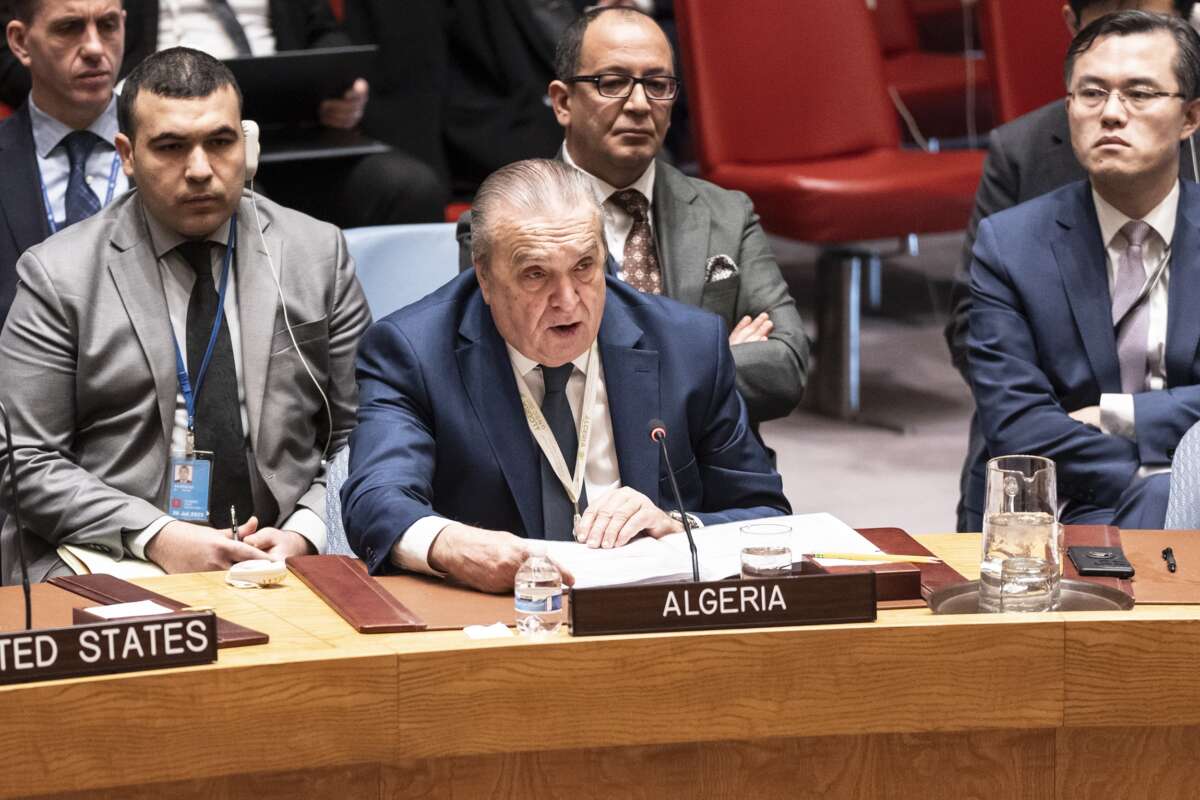Support justice-driven, accurate and transparent news — make a quick donation to Truthout today!
The United Nations (UN) delegation from Algeria has submitted a draft resolution to the Security Council, demanding that Israel end its brutal assault on Palestinians in the south Gaza city of Rafah.
“Israel, the occupying Power, shall immediately halt its military offensive, and any other action” in the city, the resolution states.
The resolution recognizes that “the catastrophic situation in the Gaza Strip constitutes a threat to regional and international peace and security” and expresses concern for the “famine spreading throughout” the region. It also condemns Israel’s “indiscriminate targeting of civilians, including women and children, and civilian infrastructure.”
Since Algeria’s liberation from France’s 132-year occupation in 1962, the North African country has consistently thrown its support behind global resistance to settler colonialism, including in Palestine, and has refused to normalize relations with Israel.
The Algerian resolution cites a recent ruling from the International Court of Justice, which also ruled that Israel must halt its military offensive in Rafah.
Since the start of Israel’s bloody siege of Rafah earlier this month, over 1 million Palestinians have fled the city, which was previously deemed a “safe zone” by Israeli officials.
Those who were unable to escape the city have faced a number of bombardments in the days since the ICJ ruling — including an Israeli attack on displaced families sheltering in tents outside of a school on Sunday. The massacre killed at least 45 Palestinians, including many children, and injured hundreds more, many of whom suffered severe burns or severed limbs.
At least nine UN member nations within the Security Council must approve the resolution for it to pass. The resolution must not be vetoed by any permanent members of the council, including the United States, a principal ally of Israel.
Several past resolutions put before the council have been blocked by the U.S. Although Ambassador Linda Thomas-Greenfield has claimed that Algeria’s draft resolution will be given full consideration, it’s likely that the U.S. will block this resolution, too.
“We’re waiting to see it and then we’ll react to it,” Thomas-Greenfield said.
The resolution’s introduction came one day before Tzachi Hanegbi, Israel’s national security adviser, suggested that military operations will continue in Gaza through at least the rest of 2024. Israel’s ethnic cleansing campaign in Gaza has killed more than 36,000 Palestinians and injured more than 81,000 since October, with thousands more missing and presumed to be buried under the rubble.
“We expect another seven months of combat in order to shore up our achievement and realize what we define as the destruction of Hamas and Islamic Jihad’s military and governing capabilities,” Hanegbi said Wednesday.
The U.S. will likely oppose (or at the very least, abstain from voting on) the Algerian resolution. Although the Biden administration once labeled an Israeli offensive in Rafah as its red line, the U.S. continues to send a steady flow of weapons to Israel as it massacres civilians in broad daylight.
Despite the horrific images coming out of Rafah — including pictures of charred corpses and a child who was decapitated by U.S.-made bombs — President Joe Biden has repeatedly expressed his unwavering support for Israel’s genocide. In an op-ed for Truthout this week, Palestinian American writer Michel Moushabeck blasted Biden for his collaboration with Israeli forces as they commit atrocities in Gaza.
“Why doesn’t our president shed tears and speak up when he sees children being burned alive in their tents? How many more inhumane and barbarous acts will it take for the U.S. to end its ‘unconditional’ financial, military and diplomatic support for the Israeli state?” Moushabeck said.
A terrifying moment. We appeal for your support.
In the last weeks, we have witnessed an authoritarian assault on communities in Minnesota and across the nation.
The need for truthful, grassroots reporting is urgent at this cataclysmic historical moment. Yet, Trump-aligned billionaires and other allies have taken over many legacy media outlets — the culmination of a decades-long campaign to place control of the narrative into the hands of the political right.
We refuse to let Trump’s blatant propaganda machine go unchecked. Untethered to corporate ownership or advertisers, Truthout remains fearless in our reporting and our determination to use journalism as a tool for justice.
But we need your help just to fund our basic expenses. Over 80 percent of Truthout’s funding comes from small individual donations from our community of readers, and over a third of our total budget is supported by recurring monthly donors.
Truthout has launched a fundraiser, and we have a goal to add 231 new monthly donors in the next 48 hours. Whether you can make a small monthly donation or a larger one-time gift, Truthout only works with your support.
